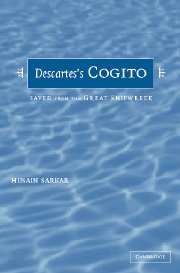Book contents
- Frontmatter
- Contents
- Preface
- Acknowledgments
- Abbreviations
- Descartes' Cogito
- 1 The Prolegomena to Any Future Epistemology
- 2 The Problem of Epistemology
- 3 The Solution: Cogito
- 4 A Skeptic against Reason
- 5 The Five Ways
- 6 Cogito: Not an Argument
- 7 The Content of the Cogito
- 8 Memory, Explanation, and Will
- Appendix A Comments on Jeffrey Tlumak's “Certainty and Cartesian Method”
- Appendix B Comments on Robert Nozick's “Fiction”
- Appendix C Cogito and the Port-Royal Logic
- Appendix D Bacon and Descartes
- Appendix E Comments on Anthony Kenny's “Descartes on the Will”
- Bibliography
- Name Index
- Subject Index
Appendix E - Comments on Anthony Kenny's “Descartes on the Will”
Published online by Cambridge University Press: 01 September 2009
- Frontmatter
- Contents
- Preface
- Acknowledgments
- Abbreviations
- Descartes' Cogito
- 1 The Prolegomena to Any Future Epistemology
- 2 The Problem of Epistemology
- 3 The Solution: Cogito
- 4 A Skeptic against Reason
- 5 The Five Ways
- 6 Cogito: Not an Argument
- 7 The Content of the Cogito
- 8 Memory, Explanation, and Will
- Appendix A Comments on Jeffrey Tlumak's “Certainty and Cartesian Method”
- Appendix B Comments on Robert Nozick's “Fiction”
- Appendix C Cogito and the Port-Royal Logic
- Appendix D Bacon and Descartes
- Appendix E Comments on Anthony Kenny's “Descartes on the Will”
- Bibliography
- Name Index
- Subject Index
Summary
Kenny's paper “Descartes on the Will” is the locus classicus on Descartes' theory of will, error, and judgment. Since much of what Kenny says in his paper has no direct bearing on the core thesis of this book, I confine myself to making an observation or two on aspects of his paper that bear more directly on Chapter 8.
There is first a purely historical issue. Kenny is keen to establish that Descartes' theory of the will in the Regulae – published only posthumously, composed as early as 1628, if not earlier – is sharply different from the one he offered in later works such as the Principles of Philosophy and Meditations on First Philosophy. Consequently, when Leslie Beck, in his The Method of Descartes (17), cites a passage from the Regulae that smacks of what Descartes was alleged to have claimed only later, Kenny responds thus:
When he wrote the Regulae, Descartes still held the orthodox Thomist view … There is, it is true, one passage which Leslie Beck sees as presupposing the later view “that judgement whether in its pure or practical use is an assent or dissent, an act of will.” But the passage is most naturally interpreted as applying only to practical matters. Descartes exhorts us, in studying, “to think solely of increasing the natural light of reason, not with a view to solving this or that scholastic problem but in order that in all the happenings of our life, our intellect may show our will what alternative to choose.” […]
- Type
- Chapter
- Information
- Descartes' CogitoSaved from the Great Shipwreck, pp. 287 - 293Publisher: Cambridge University PressPrint publication year: 2003



